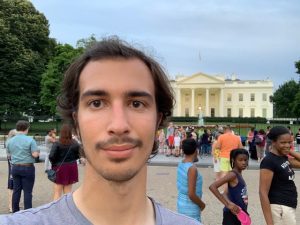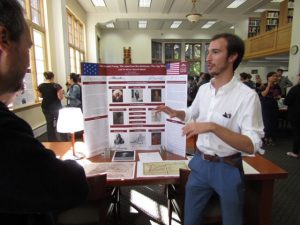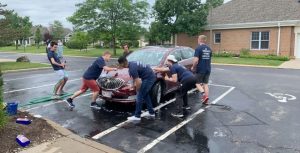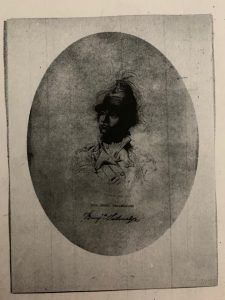Introduction
I’ve never imagined that I would write a blog. I always thought blogging was sort of outdated—the relic of the past. But with the need to work remotely due to coronavirus outbreak, I guess this old technology is quite useful—and I’m ‘kinda’ excited to share my summer research experience with the campus community, our alumni, parents, and others. When I started thinking about how my blog would look like, I quickly realized that it might not be prudent to just ponder into heavy questions about past and complex concepts that in many aspects, often are boring and frankly not interesting to many people. Studying history has to be engaging, intriguing, and, in a sense, fun. We simply can’t understand what happened in the past until we fill confident in this, for many, foreign territory. Once we do, we can ask many interesting questions, develop a road map, and start searching for clues. With that said, I attempt to make this blog as ‘casual’ and funny as I can. But before I disclose what topics I intend to discuss in my weekly (and potentially semiweekly) blog posts, I think it would be courteous to introduce myself and talk about my interests first.
What is my major(s)?
I’m double majoring in United States Politics and Government and History. There are a couple of reasons why I decided on those two majors. First, I’d like to get a law degree one day, so majoring in political science and history was in a way “must” take route. Second, since I was a child, I’ve been intrigued with the past and historical figures such as Julius Caesar, Napoleon, Mother Theresa, Pope John Paul II, George Washington, Martin Luther King, and John F. Kennedy. But, most importantly, I decided to major in ‘PG’ and history, because I wanted to learn more about the country I love and one that I want to serve.
Why did I decide to do summer research this year?
Actually, this year’s summer research experience is not the first time I’m doing summer research. Last year I was awarded a research award to study Intelligence during the American Revolution and was able to travel to Washington, D.C., and visit the Library of Congress and National Archives.
Studying history of the American Revolution in our nation’s capital was certainly one of, if not the most beautiful, experience and honor I had. I was able to get access to documents written by our founders such as Washington and Jefferson, and notable historical figures such as Benjamin Tallmadge, Abraham Woodhull, General Clinton, Isaac Foster, Consider Tiffany, and many more. I was suddenly immersed in the history I’ve learned in school. I’ll never forget when I was analyzing Jefferson collection and looking at the Declaration of Independence—I was literally fricking out—all of my dreams came true. Besides looking at the archival collection, I visited as many museums as I could. I will never forget a visit to the Spy Museum, where the letter establishing American Intelligence during the Revolutionary period is located besides cool exhibits about the Cold War espionage. But two other museums—National Museum of American History and National Museum of African American History and Culture—left the biggest impression on me.

Summer Research 2019, Washington, D.C.
However, once the research experience was over and research paper composed, I didn’t stop searching for an answer why so many colonials betrayed the British crown they were swearing allegiance to and decided to support American cause before the new country was created. I found a potential answer in a concept known as rites of passage or liminality and presented it in my senior thesis earlier this year. Although I think the latter is a satisfying explanation, I continue to explore the revolutionary intelligence and search for other possible answers—I admit, I’m nerd fascinated with early American history.
But besides searching for potential answers and constructing arguments, the other fascinating stage of research is a presentation of the argument. I’ve been honored to be able to present my research on the revolutionary intelligence at the AHSS Symposium last Fall, Board of Trustees Symposium featuring last summer research projects this February, University of Washington Undergraduate Symposium in May, and Macksey Symposium organized by the John Hopkins University.

Presenting my 2019 Summer Research at the 2019 AHSS Symposium at the Collins Memorial Library.
Exactly, this ability to look for potential answers, analyze documents hidden behind closed doors, meet people from different backgrounds, hear diverse opinions, and be able to share and celebrate my accomplishments at academic symposiums encouraged me to continue pursuing independent research and apply again for the summer research award this year. The other reason why did I apply again for this wonderful opportunity was the desire to bring my research experience to a higher level. I wanted to work on something where a bunch of primary sources is not translated and utilize my foreign language skills. I also wanted to understand what role collective memory plays in understanding the past. And, finally, try to develop an argument for a peer-reviewed publication.
What are my career goals?
Upon completion of my undergraduate program at UPS, I’m planning to attend Law school—I’m hoping to be accepted to the Ivy League program—and study American Constitutional Law.
Often people ask why I want to be a lawyer, and my answer almost always is that I’m fascinated by law and legal writing. I love solving puzzles, developing arguments, and learning more about a remarkable document known as U.S. Constitution. But, most importantly, I’d like to devote my life to public service and country I love and pledge allegiance to, the United States of America.
What music, movies, TV Shows, books I like?
I love listening to country music, rock and roll, and classical music. I like historical movies, good dramas, and comedies. If I have to narrow down to a couple of movies, my favorite movies are Argo, La La Land, Patriot, Iron Lady, and any movie with Jack Lamon and Tony Curtis. My favorite T.V. show is the Netflix series The Ranch with Sam Elliot and Ashton Kutcher. And, finally, on a book question, I enjoy reading history books and biographies. I’m currently reading “Exercise of Power: American Failures, Successes, and a New Path Forward in the Post-Cold War World” by former Secretary of Defense, Dr. Robert M. Gates.

I believe that public service and giving back to your community are one of the most important values in human life. Volunteering at the local retirement community with my Beta Theta Pi brothers, Oxford, OH.
What are my hobbies?
Going for long walks. I just like spending time in nature. I also like playing sports with or just talking with my friends. Finally, I love reading articles on foreign policy and analyzing poll numbers, especially when we are in the election year—sometimes I wonder whether I should become a political analyst on T.V. Also, just to mention… I’m Seattle Mariners Fan.
Now, after I introduced myself—and hope that I’m not too boring—it is time to introduce topics I will explore in the next coming weeks. First, I will talk about how my typical summer research day looks like. Then, we would ponder into concepts such as liminality, memory, nationalism, and others that are part of my research. And finally, occasionally, I will try to connect past with the present and try to figure out how studying history might help us understand the present and future. I presume, now I should tell you what research questions we will look at—the envelope please, or rather, the drum roll, please…
One of the topics will be an area of history I know the most about, and something that has been part of my academic interests for some time is the American Revolution and the Revolutionary Intelligence. In my posts, I will summarize arguments I made in my previous writings on this topic, explain why I believe that notion of liminality is the best explanation for colonial spying, and understand what word ‘American’ meant for our colonial ancestors fighting American Revolution. We will also ponder into an exciting and fascinating world of spies such as Nathan Hale, Abraham Woodhull, Benjamin Tallmadge, Robert Townsend, Anna Smith Strong, and many others. I will attempt to write these posts in Agatha Christi’s or James Patterson’s style with as much suspicion as I can. Pick an alias, find a good costume, and put your spying glasses on, and you are ready for this journey through the secretive world of American Revolutionary spies.

The Culper Ring’s Chief Intelligence Officer Benjamin Tallmadge, Library of Congress.
The second topic we will explore in this blog is my current summer research question (two questions to be precise): In what way(s) might the old, often forgotten, multi-national Hapsburg Empire be still politically and economically active? How and in what way(s) might people be looking back with nostalgia to this time period? Drawing on secondary literature and primary sources, we will try to understand why, and if, such a strong sentiment for the Hapsburg Empire exists in the post-90s Croatian society. We will also try to see whether this nostalgia was actually fabricated and produced in the 1990s to distinguish Croatian identity from the Serbian and Yugoslav one. Theories of nationalism, including Benedict Anderson, Ernest Gellner, among the few, collective memory, and commemorations, will be in the center of the analysis.
I hope you will join me on this remarkable ride, known as studying history. I promise it will not be boring. Welcome on board!
